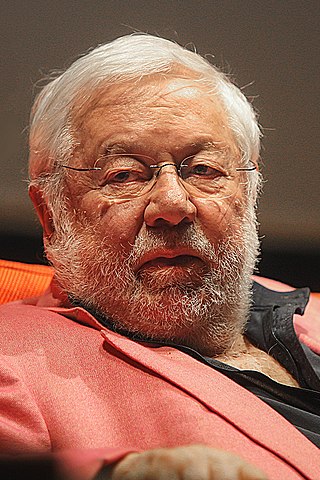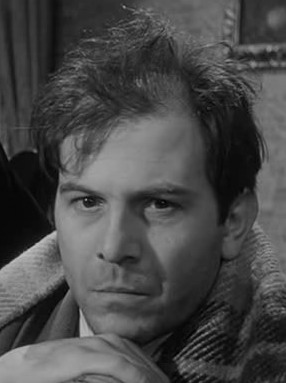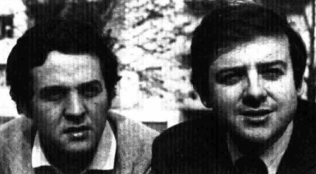Related Research Articles

Francesco Guccini is an Italian singer, songwriter, actor, and writer. During the five decades of his music career he has recorded 16 studio albums and collections, and 6 live albums. He is also a writer, having published autobiographic and noir novels, and a comics writer. Guccini also worked as actor, soundtrack composer, lexicographer and dialectologist.

Paolo Villaggio was an Italian actor, writer, director and comedian. He is noted for the characters he created with paradoxical and grotesque characteristics: Professor Kranz, the ultra-timid Giandomenico Fracchia, and the obsequious and meek accountant Ugo Fantozzi, perhaps the favourite character in Italian comedy. He wrote several books, usually of satirical character. He also acted in dramatic roles, and appeared in several movies.

Diego Abatantuono is an Italian cinema and theatre actor, and screenwriter, three-time winner of the Nastro d'Argento.

Franco Califano was an Italian lyricist, composer, singer-songwriter, author and actor. His songs sold about 20 million records during his career.

Enrico Maria Salerno was an Italian actor, voice actor and film director. He was also the voice of Clint Eastwood in the Italian version of Sergio Leone's Dollars Trilogy films, and the voice of Christ in The Gospel According to St. Matthew directed by Pier Paolo Pasolini.

Vincenzo "Enzo" Jannacci ; 3 June 1935 – 29 March 2013) was an Italian singer-songwriter, pianist, actor and comedian. He is regarded as one of the most important artists in the post-war Italian music scene.

Lino Banfi is an Italian actor and screenwriter. Since 1960 he has appeared in more than 100 films.

Laura Belli is an Italian actress and singer.

Calogero Alessandro Augusto Calà, known by his stage name Jerry Calà, is an Italian actor, filmmaker, comedian and singer who has written, directed, and acted in multiple film and television projects. He is considered one of the most popular Italian comedians of the eighties and nineties in his country.
I Nuovi Angeli are an Italian pop band formed in 1966 in Milan. The name refers to the eponymous drama film directed by Ugo Gregoretti in 1962.

Umberto Smaila is an Italian actor, composer, comedian, television personality, entrepreneur, and musician.

Renato Pozzetto and Cochi Ponzoni are an Italian musical and comedy duo who works as Cochi e Renato.

The Sanremo Music Festival 1988, officially the 38th Italian Song Festival, was the 38th annual Sanremo Music Festival, held at the Teatro Ariston in Sanremo between 24 and 27 February 1988 and broadcast by Rai 1. The show was presented by Miguel Bosé and Gabriella Carlucci, while Carlo Massarini hosted the segments from the Sanremo PalaRock, and Kay Sandvick, Lara Saint Paul and Memo Remigi hosted the segments from the Sanremo Casino where a number of foreign guests performed.

Fanny Cadeo is an Italian actress, television personality, singer, and model. Cadeo was born in Lavagna and studied acting with Beatrice Bracco. She achieved her first success in 1992 when she was one of the first showgirls to appear in Striscia la notizia and remained with the show until 1994. Since 2013, she has been the presenter of the Rai Due television show Il Cercasapori.

"Io che amo solo te" is a song composed and performed by Sergio Endrigo and arranged by Luis Bacalov. One of Endrigo's major hits, the song was released in the summer of 1962 but became a success only at the end of year, eventually peaking at the second place on the Italian hit parade and selling over 650,000 copies.
This is a list of Italian television related events from 1977.
Arrivano i gatti is a 1980 Italian comedy film directed by Carlo Vanzina starring the comedy group I Gatti di Vicolo Miracoli.

Odissea nell'ospizio is a 2019 Italian comedy film directed by Jerry Calà.
Gli inaffidabili is a 1997 Italian comedy film directed by Jerry Calà.

Nicoletta Elmi is an Italian film actress. She appeared in many films in the 1970s as a child actress, but also appeared in several roles in adulthood in the 1980s.
References
- 1 2 3 4 5 Casarini, Enrico (28 January 2021). "I Gatti di Vicolo Miracoli festeggiano 50 anni insieme". TV Sorrisi e Canzoni (in Italian). Retrieved 2 August 2023.
- 1 2 3 4 5 Assante, Ernesto (1990). "Gatti di Vicolo Miracoli, I". Castaldo, Gino (edited by). Dizionario della canzone italiana. Curcio Editore. p. 456.
- 1 2 3 4 5 6 Cappa, Felice; Gelli, Piero; Mattarozzi, Marco (1998). "Gatti di Vicolo Miracoli". Dizionario dello spettacolo del '900 (in Italian). Baldini & Castoldi. p. 158. ISBN 978-88-8089-295-3.
- ↑ Grasso, Aldo; Scaglioni, Massimo (1996 – 2003). Enciclopedia della Televisione. Garzanti. p. 480. ISBN 881150466X.
- ↑ Salvatori, Dario (1989). Storia dell'Hit Parade. Gramese. p. 145. ISBN 8876054391.